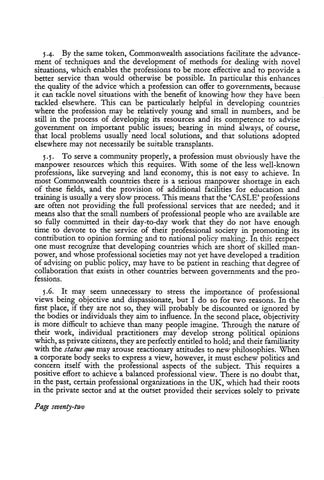.4. By the same token, Commonwealth associations facilitate the advancement of techniques and the development of methods for dealing with novel situations, which enables the professions to be more effective and to provide a better service than would otherwise be possible. In particular this enhances the quality of the advice which a profession can offer to governments, because it can tackle novel situations with the benefit of knowing how they have been tackled elsewhere. This can be particularly helpful in developing countries where the profession may be relatively young and small in numbers, and be still in the process of developing its resources and its competence to advise government on important public issues; bearing in mind always, of course, that local problems usually need local solutions, and that solutions adopted elsewhere may not necessarily be suitable transplants. To serve a community properly, a profession must obviously have the manpower resources which this requires. With some of the less well-known professions, like surveying and land economy, this is not easy to achieve. In most Commonwealth countries there is a serious manpower shortage in each of these fields, and the provision of additional facilities for education and training is usually a very slow process. This means that the 'CASLE' professions are often not providing the full professional services that are needed; and it means also that the small numbers of professional people who are available are so fully committed in their day-to-day work that they do not have enough time to devote to the service of their professional society in promoting its contribution to opinion forming and to national policy making. In this respect one must recognize that developing countries which are short of skilled manpower, and whose professional societies may not yet have developed a tradition of advising on public policy, may have to be patient in reaching that degree of collaboration that exists in other countries between governments and the professions. .6. It may seem unnecessary to stress the importance of professional views being objective and dispassionate, but I do so for two reasons. In the first place, if they are not so, they will probably be discounted or ignored by the bodies or individuals they aim to influence. In the second place, objectivity is more difficult to achieve than many people imagine. Through the nature of their work, individual practitioners may develop strong political opinions which, as private citizens, they are perfectly entitled to hold; and their familiarity with the status quo may arouse reactionary attitudes to new philosophies. When a corporate body seeks to express a view, however, it must eschew politics and concern itself with the professional aspects of the subject. This requires a positive effort to achieve a balanced professional view. There is no doubt that, in the past, certain professional organizations in the UK, which had their roots in the private sector and at the outset provided their services solely to private Page seventy-two
The Professions, Universities and the Civil Service; Mutual Interaction, 1975

Issuu converts static files into: digital portfolios, online yearbooks, online catalogs, digital photo albums and more. Sign up and create your flipbook.





